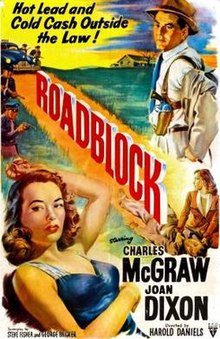Roadblock (film): Difference between revisions
TheOCflash (talk | contribs) Copy edits |
|||
| Line 57: | Line 57: | ||
==External links== |
==External links== |
||
* [http://noiroftheweek.blogspot.com/2008/02/roadblock-1951.html Film Noir of the Week] |
|||
* {{imdb title|id=0043973|title=Roadblock}}. |
* {{imdb title|id=0043973|title=Roadblock}}. |
||
* {{amg movie| id=1:108137|title=Roadblock}} |
* {{amg movie| id=1:108137|title=Roadblock}} |
||
Revision as of 08:15, 3 March 2008
| Roadblock | |
|---|---|
 Theatrical Poster | |
| Directed by | Harold Daniels |
| Written by | Screenplay: George Bricker Steve Fisher Story: Richard H. Landau Daniel Mainwaring |
| Produced by | Lewis J. Rachmil |
| Starring | Charles McGraw Joan Dixon |
| Cinematography | Nicholas Musuraca |
| Edited by | Robert Golden |
| Music by | Paul Sawtell |
| Distributed by | RKO Radio Pictures |
Release dates | September 17, 1951 (U.S.A.) |
Running time | 73 minutes |
| Country | United States |
| Language | English |
Roadblock (1951) is a American film noir starring Charles McGraw and Joan Dixon. The 73-minute crime thriller was shot on location in Los Angeles, California. The film was directed by Harold Daniels and the cinematography is by Nicholas Musuraca.[1]
Plot
Insurance investigator Joe Peters (McGraw) falls for money-loving Diane (Dixon). The couple meet in an airport and wind up sharing a hotel room in Kansas after their plane is forced to make an emergency landing.
Diane wants Joe but loves the finer things in life like furs, jewelry, and more. Peters can't afford things like that on his small $350 a month salary, so normally "Honest Joe" Peters (what Diane call him), sets up a heist in an attempt to finance a dream life with Diane.
After the crime--an elaborate railway mail car robbery--things begin to go awry and love sick Peters tries to cover up his actions.
Cast
- Charles McGraw as Joe Peters
- Joan Dixon as Diane
- Lowell Gilmore as Kendall Webb
- Louis Jean Heydt as Harry Miller
- Milburn Stone as Egan
Noir analysis
In noir fashion sex and money leads to Peters destruction in the film. According to film critics Bob Porfiero and Alain Silver, the screenwriters take a hard-boiled mystery plot and combine it with "an aura of middle-class malaise and pervasive corruption to provide a motivation for Peter's alienation and fall." And, the noir notion of entrapment is illustrated by the staging of Peters death in the dry Los Angeles river bed.[2]
Noir dialogue
The hard-edged clipped dialogue between the two lead actors--Joe Peters and Diane--is typical of film noir. The following is an example early in the film when Joe and Diane first get to know each other:
- Joe: What makes you the way you are?
- Diane: What makes anybody the way they are?
- Joe: You tell me.
- Diane: Where they got started maybe. I had a lot of jobs - modeling, clerking, secretarial work. I tried hard but it was no go.
- Joe: Does that make a chiseler out of you? Must have been something else.
- Diane: Whenever I got a job there was always a man who wasn't interested in my working ability.
- Joe: I understand that.
- Diane: Really? Coming from you that's a compliment.
Critical reaction
Hans J. Wollstein, writing for the All Movie Guide, calls the film a "low-budget but highly engrossing film noir,"[3] and Dennis Schwartz, at Ozus' World Movie Reviews writes, "In the end everything was done in such a flat manner, that it was hard to care that straight-shooter McGraw lost his integrity and life for an icy broad who ironically would have loved him the way he was."[4]
References
- ^ Roadblock at IMDb.
- ^ Silver, Alain and Elizabeth Ward. Film Noir: An Encyclopedic Reference to the American Style. Film noir analysis by Bob Porfiero and Alain Silver, page 244. The Overlook Press, 3rd edition, 1992. ISBN 0-87951-479-5.
- ^ Wollstein, Hans J. All Movie Guide, film review. Last accessed: December 8, 2007.
- ^ Schwartz, Dennis. Ozus' World Movie Reviews, film review.
External links
- Film Noir of the Week
- Roadblock at IMDb.
- Roadblock at AllMovie
- Roadblock at the TCM Movie Database.
